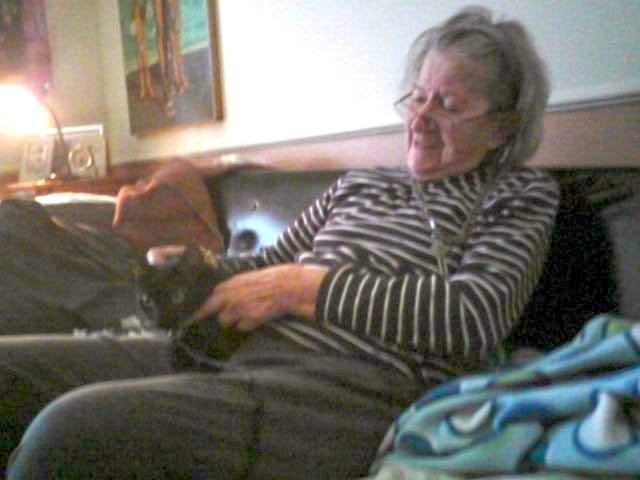Paul received a message from the hospice nurse that Dorris
was agitated. His text asked me to go over and see her after class.
I decided to bring one of our cats for a “cat therapy”
visit. In an unusual demonstration of empathy, Natalia settled down into Dorris'
lap and purred her enjoyment of the scratches and petting. Dorris settled in
quite nicely, too.
I began to dig through her closet to find some clothes to
wear for her trip to our house for Easter. I found a jacket and asked her if
she would like to wear it.
“Yes,” she said, “it has a bit of magnificence about it.”
It is interesting to me how quickly the Dorris I know and
love can seemingly leave and then return. In the thirty years I have known her, until her
Alzheimer’s, Dorris never, ever gave the impression that she was lost, or
somehow not in control of all that was happening around her. I loved that
constant assurance.
She is now at the stage where nothing is familiar for more
than a few seconds at a time. When I visit with the cat, I must tell her over
and over, that the cat does not live in this room, that the cat came to visit
Dorris – not the other way around. I must constantly answer her question with the
assurance that this room is where she lives and that it is not my house.
Today, I responded to the familiar questions by asking her
if she recognized the furniture, pictures, and sculpture in the room.
“Well, they do look familiar - like I have seen them somewhere before.”
Imagine living in a world where things looked vaguely
familiar, but not like home. Then, imagine rediscovering this about every 10-15
seconds.
It is little wonder that she gets agitated. It is more of a
wonder why she isn’t agitated all of the time.
But a nine-pound cat can make all the difference. A cat
doesn’t have to be familiar. It doesn’t have to belong. Once it snuggles in and
starts purring, that is enough familiarity to keep anyone happy.
Thank you, God, for pets.
On the days leading up to Good Friday, Jesus tried to warn
the disciples that change was in the works. His behavior must have been
unfamiliar to his followers. Jesus raged in the temple, rode a donkey, washed feet, and allowed His capture.
Jesus’ death meant that, even though, the world was full of
familiar things – nothing was, or ever would be, the same again.
In this the love of God was made manifest
among us, that God sent his only Son into the world, so that we might live
through him. In this is love, not that we have loved God but
that he loved us and sent his Son to be the propitiation for our sins.
(I John 4: 9-10, ESV)
The fact that our sin could only be
appeased by the death and resurrection of God’s Son should be a source of
constant agitation, and guilt, and humiliation. Instead, Jesus took these
emotions as a burden along with our sins.
Our sin prevents us from making heaven a
familiar home.
God’s love creates the home where we will
live, forever, in His most familiar love and care.
By this we know that we abide in him and he
in us, because he has given us of his Spirit. And we
have seen and testify that the Father has sent his Son to be the Savior of the
world.
(I John 4: 13-14, ESV)


No comments:
Post a Comment